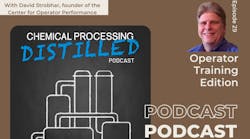Welcome to the Operator training edition of Chemical Processing's Distilled Podcast. This podcast in its transcript can be found at chemicalprocessing.com. You can also download this podcast on your favorite player. I'm Traci Purdum, editor-in-chief of CP. Joining me to help resurrect our operator training discussions we had years ago is Dave Strobhar, founder and principal human factors engineer for Beville Engineering. Dave is also the founder of the Center for Operator Performance.
Hey, Dave, how are you? It's been a couple years since we've chatted.
Dave : Yeah, yeah. A couple of eventful years with Covid, so it's great to be back, Traci, and looking forward to things getting back to normal on this end.
Traci: All right. Well, I don't know if they'll ever get back to normal, but status quo might be better.
Dave: Right, exactly.
Traci: You were recently involved with some research that pointed to the fact that advanced process control degrades operator skills. Can you talk a little bit about that study?
Dave: Sure, sure. A little background is that ever since advanced process control has been implemented on various units, there was a feeling going around that because the APC, the advanced process control was doing a lot of the operating that the operators skills were degrading. They weren't getting the practice that they were used to having without APC. This was a feeling and people sort of suspected it, and they were even companies that we're taking actions to correct for it by turning the APC off for a week at a time. All of this was done just on sort of a gut feel. I had an operator one time tell me, he said, "APC makes good operators better and bad operators worse." This notion of skill degradation has been in the industry for at least over a decade and maybe closer to almost two decades now, where there was this belief that there was a degradation.
Well, the Center for Operator Performance wanted to find out, part of our goal was to quantify things that are in the industry, and one of them was, so we asked the question, is there a performance decrement if you are running advanced process control? People believed there was, but we really had no data on whether there was or wasn't. It might just be a sort of folk myth that was going around the industry. The Center for Operator Performance commissioned a study with James Henry at Lamar University to look at is there a loss of skill with advanced process control? Dr. Henry used a group of engineering students to try to test out whether this hypothesis were true or not. What he did was he took a number of students and trained them on how to run a debutinizer on a distributed control system.
They spent approximately three weeks going through training to get them up to a reasonable level of performance that they could sustain. Then after that point, the group went through various periods, they were split up in terms of how long would they operate with the advanced process control on versus how long would they operate with the advanced process control off. What Dr. Henry came away with was actual data that showed that decrement. After just a week with the APC on, there was a loss of about 10% of their skill level with it on for two weeks continuously.
If the student hadn't had to interact with the process for two weeks, there was almost a 50% loss in performance. It went from 60% accuracy rate down to about a 30% accuracy rate. At that point, it stayed pretty steady. It turns out most of the loss occurred in the two weeks immediately after the APC was active and then it stayed steady. There was no loss after that. Didn't matter how long they were on, whether they were on 3, 4, 5, 6 weeks, there was no additional performance loss. This answered just a wide range of questions that the industry members that make up the Center for Operator Performance had had.
All right. We suspected that there was a loss with APC, and what we found is yes, indeed, there does appear to be a loss with APC. The question was, well, when does it occur? Does it occur only after I've been on APC for a long time? Does it occur right away? How long before we see the decrement? The data came back and said, well, the decrement here occurred almost immediately. The other question was just, do you keep just getting worse and worse and worse and worse? The answer is no, that you do plateau out at a certain level. It provided a lot of data that now the industry reps can make decisions regarding, well, how do they want to deal with this? How do they want to address this potential skill loss that we're seeing?
Now, we know this was done with students, and so we wouldn't expect the exact numbers to be the same with process plan operators, but we would expect the patterns to be very similar because that's what we've seen elsewhere is that when we have students do it, and then we have actual operators do it, the actual operators, of course, they perform better than the students. And so, the numbers are a little different, but the patterns tend to be about the same. You see that same sort of pattern. That same decrement we would expect to see with the actual operators. Now we know that we know that decrement is there. Now we can start looking at, okay, how are we going to change things to bring that decrement back and get the operators up to full performance?
Traci: Talking with the students, and the students are next year's workforce. There's a lot of concern regarding a retiring workforce and those folks taking their skills with them. Advanced Process Controls seems to be the way around this, but does this study point to the contrary?
Dave: Well, no. I think one of the advantages of course, is that the APC acts like an experienced operator all the time, regardless of the actual operator's skill level. It is absolutely a potential cure for the skill loss that we're seeing with the wave of retirements that is coming. But what this is saying, though, is that in going back to the comment of making a good operator better and a bad operator worse is that if you rely solely on the APC, then the overall level of competency, particularly if your operators are new and don't have experience, should the APC have to be turned off, gets kicked off, that their performance levels are not going to be where you want them to be. You're going to need some sort of interventions to get those levels up. And so you want those interventions that create that APC that makes the good operator better. That's going to be the challenge for the industry is coming up with those interventions.
Traci: Should operators periodically run the plant then without the APC to ensure their skills are maintained? Is that what this suggests?
Dave: Well, it does, and there are plants that are doing that. The problem is that when you start looking at what APC is gaining you in monetary value, and you start calculating that for the period that you've turned it off, what you find is that you have some very expensive training that is going on. The data here also, if the degradation didn't occur right away if we didn't see the degradation until four months out, that would make it easier to do that sort of intervention. What we're seeing is that the degradation is occurring very quickly after on APC. You can't just constantly be turning it on and it off. It argues that is an option. It can be an expensive one. It's not particularly good because of the nature of where this decrement is occurring. I think there are other options, and that's what the Center for Operator Performance is looking into to go against this degradation.
Obviously, simulators would be a potential way to say, "Okay, if we see this degradation from an operator working on their actual process if we were to put them on a simulator, does that allow them to regain their skill level?" Another option is looking at micro-learning. Rather than using a simulator, are there things that can be done in micro-learning applications where you would send essentially a video or some additional information or challenging questions to the operator during this period that they're on APC? Would that engage them enough to keep the skill level up?
The third thing we're looking at is the center has found that the interface, the graphics for APC tend to be very poor and they're made for engineers and not for operators. We're looking at creating a set of graphics or graphic template that hopefully would allow the operators to maintain some of their skills over time, even when the APC is on. All three of those potential intervention techniques are going to be researched by the center. Now that we have a way of measuring this degradation, now we can look at, okay, if we put these interventions in place, what's going to happen? And then we can evaluate which intervention has the best performance gain for the relative cost associated with it. Turning off the APC, definitely an option, but it may be a very expensive option to keep your operated performance at the level you want it to be at.
Traci: Very expensive. While you're working through this, while you're studying this and thinking of ways, are there ways right now that facilities can ensure that operators can function well with and without the APC? Here's a question for you. What happens if the APC goes down? What happens then?
Dave: Well, and that's the fear is that there's going to be periods where the APC will go down. Now the autopilot's been turned off and you've turned it over to the pilot and said, "Hey, it's yours. You take it." If they've been operating a long time on APC, their skills aren't going to be as good. The question is that are they good enough? And that's each company needs to make that sort of decision because it's going to happen. Now, there are industries particularly in the batch world where they use these automated systems, they've gotten so complex that they just accept that if the automatic system fails that they can't run in manual anymore, that they can't just have an operator do it. Obviously in these large continuous processes, that's probably not an option that the APC kicks off and you just shut the plant down.
It is a question of what is acceptable in skill loss when the APC goes down. For right now, turning the APC off maybe a week at a time is not the best way to do that. Maybe one hour out of a given shift might be a way to bring that skill level up. Right now, we don't have any data to say, okay, when will that intervention be appropriate? That is probably the simplest method. As I said, it can be very pricey, but right now that's probably the only tool in the toolkit to get that performance level back up.
Traci: Dave, is there anything you want to add that maybe we didn't touch on that you think is important on this topic?
Dave: Well, I do, and I think it's a changing role of the operator in that, and this has been seen in other industries, it's been seen in aerospace. What an operator used to do is now being done by some automatic system, in this case, the APC. A key challenge for the industry going forward is how do we integrate what the military would call this electronic crew member, the APC is the electronic crew member. How do we integrate them into the crew? They're not just something out there doing something, they're part of what is being done. The console operators need to understand what they're doing. They need to be on the same page. We're getting to a point where the operator is no longer going to be operating. They're going to be supervising this electronic operator that's going to be doing the moves.
This is a shift in the nature of what we would call a console operator from being directly involved in manipulation of controllers and pumps to overseeing an automatic system that's doing this in this sort of supervisory control shift has implications for who we select to do the job, how we train them to do the job. That shift is coming and the economics are such that the automatic system, the apc, it's going to be here for a while. We need to find out how do we best use that, and I think that's the next step in moving forward.
Traci: Well, Dave, I know your goal is always to make good operators better and bad operators better unlike APC. I appreciate the time that you've put into this and all of the thought leadership based on that. If you want to stay on top of operator training and performance, subscribe to this free podcast via your favorite podcast platform to learn best practices and keen insight, you can also visit us at chemicalprocessing.com for more tools and resources aimed at helping you achieve success. On behalf of Dave, I'm Traci. And this is Chemical Processing's distilled podcast operator training edition. Thanks for listening. Thanks, Dave.
Dave: Thank you very much, Traci.



